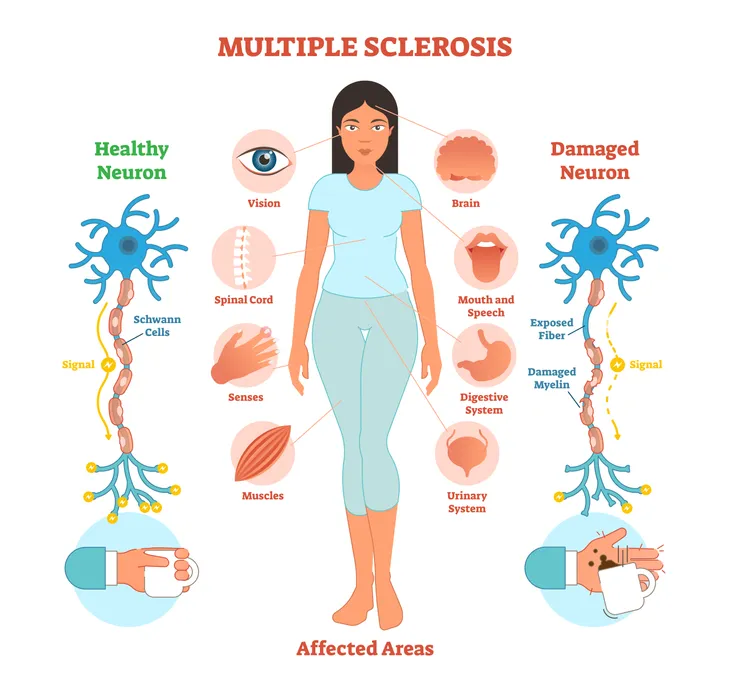Multiple Sclerosis, often referred to as MS, is an autoimmune neurological condition that can impact patients in various ways and in some rare cases, even be fatal due to complications. This disabling disease causes the immune system to attack the myelin protecting the nerve fibers which impacts communication between the brain and the rest of the body.
While the condition is progressive, it can have varying symptoms in women as compared to men, and women are more commonly diagnosed with the condition (about 4 to 1, according to ScienceDaily.com). Let’s take a look at 12 signs and symptoms of MS that are common among female patients…
Mood Impacts
Women’s Health talks about “cognitive and emotional problems” related to MS in women as one of the early markers of the disease. About 60-percent of those with a diagnosis of MS also suffer from some form of emotional distress.
Mood-related symptoms include depression, irritability, mood swings, and fits of crying or even laughing. Cognitive signs include memory trouble, inability to multitask, and trouble concentrating on a task.
Loss of Coordination
MS involves the body’s immune system attacking the nervous system that controls movement and other functions, so it’s no big surprise that it can impact coordination.
Healthline says MS patients can experience balance problems along with a lack of coordination, and the woman may feel more clumsy than usual. It notes there can also be difficulty in moving your limbs and trouble walking.
Periods End
This symptom is quite specific to women, and it involves the menstrual cycle. Women’s Health explains that any illness that throws your immune system out of whack, such as MS, can block your period (a condition called amenorrhea).
It’s quite normal for your body to skip a period occasionally due to stress or temporary illness. But if your period disappears for more than 3-months consecutively (with no other explanation), you should consult a doctor.
Feeling Unusual Sensations
Women’s Health notes that there can be some “sensory issues” connected with MS, and they can be somewhat complicated. “For example, when they put on their shirt, it feels differently sliding over their chest than it does going over their stomach,” notes the source.
The source cites a celebrity example of actress Jamie-Lynn Sigler feeling an “odd sensation” in her legs at age 20, only to be diagnosed with MS a short time after. Legs are often the first place you’ll feel symptoms, but the back is another common problem area.
Extreme Feelings of Fatigue
MSTrust.org calls this “MS fatigue,” and says it’s very different from simply being tired or even exhausted from activity. This form of fatigue “often involves the sudden loss of energy, and not being able to continue an activity,” explains the source.
The fatigue can either be physical, mental, or both. Feeling very tired can affect short-term memory and the ability to find the right words. Rest can sometimes reduce your MS symptoms, but the fatigue cannot be dealt with in the same way as those without the condition.
Loss of Color Vision
Women’s Health says that even if you once had a good eye for distinguishing colors, MS creeping in can take away this ability. This related condition is called optic neuritis and is a result of the loss of insulation around the optic nerves in the brain.
On top of losing color vision, MS can also cause partial blindness or complete blindness in one eye. The onset of visual problems associated with MS tends to be slow. If you notice any major changes in vision, you should consult a doctor.
Random Nausea or Dizziness
Nausea in women can be triggered by pregnancy or perhaps overindulging in certain foods (which men are also prone to), but the nausea that comes with MS is often connected with dizziness, explains Women’s Health.
It says an early MS symptom in women is “extreme vertigo,” which is the feeling like you’re on a roller coaster or perched somewhere high, and it’s caused by an inner ear problem. Dizzy spells aren’t a clear sign of MS, as they can also be a result of anemia, reactions to medications, low blood sugar, or even low blood pressure. Consult your doctor to sort it out.
“Sleepy” Feet
That “pins and needles” sensation can happen if you’re sitting in the same position for too long due to lack of blood flow. But if you find your feet are “falling asleep” more often than usual, it could be your body trying to tell you something.
Women’s Health says that frequently tingling feet, legs, arms, or hands can be a sign of MS. However, these feelings “could also be red flags that something other than MS is up,” such as peripheral nerve damage, infections, malnutrition, or thyroid issues.
Bowel or Bladder Changes
MS damages the pathways of the nervous system that regulate bladder and bowel function, which can in turn cause more trips to the bathroom, notes Healthline.
Possible related problems include trouble starting urination, more frequent urge to urinate, bladder infections, incontinence (leakage), constipation, or diarrhea.
Can’t Distinguish Temperature
If you’re holding an ice cube, you should be able to tell it’s cold, right? This is not always the case if you’re dealing with MS, notes Women’s Health. It says it can be tough to distinguish whether water in a sink is hot or cold if MS is affecting your nerves.
This might also mean you’re no longer able to sense changes in temperature with your hands, which is another telltale sign of MS nerve damage. If you find that it’s tough to tell if the bath water is the right temperature by dipping your hand in, you should see a doctor.
Symptoms Worsen After Menopause
Here’s another one that’s exclusive to women. The National Multiple Sclerosis Society says that about half of postmenopausal women with MS in England reported worse symptoms after menopause.
However, 75-percent of women among this relatively small sample group said their MS symptoms improved with hormone replacement therapy. “The researchers suggest that the results of the small study support the possibility that the drop in estrogen levels that accompanies menopause may have an adverse effect on the MS disease process,” writes the source. However, hormone replacement therapy carries risks and more research is needed as to its effects on MS.
Improvement During Pregnancy
We thought we’d end this one on a slightly more positive note. Healthline explains that not only has research found that MS doesn’t affect female fertility but also symptoms might actually subside during pregnancy.
The source says, “For most women, MS symptoms actually stabilize or improve during pregnancy, especially during the second and third trimesters.” So, if you have MS and want to be a mother, the disease won’t stop you. However, something to consider is that symptom relapse is common following delivery.















